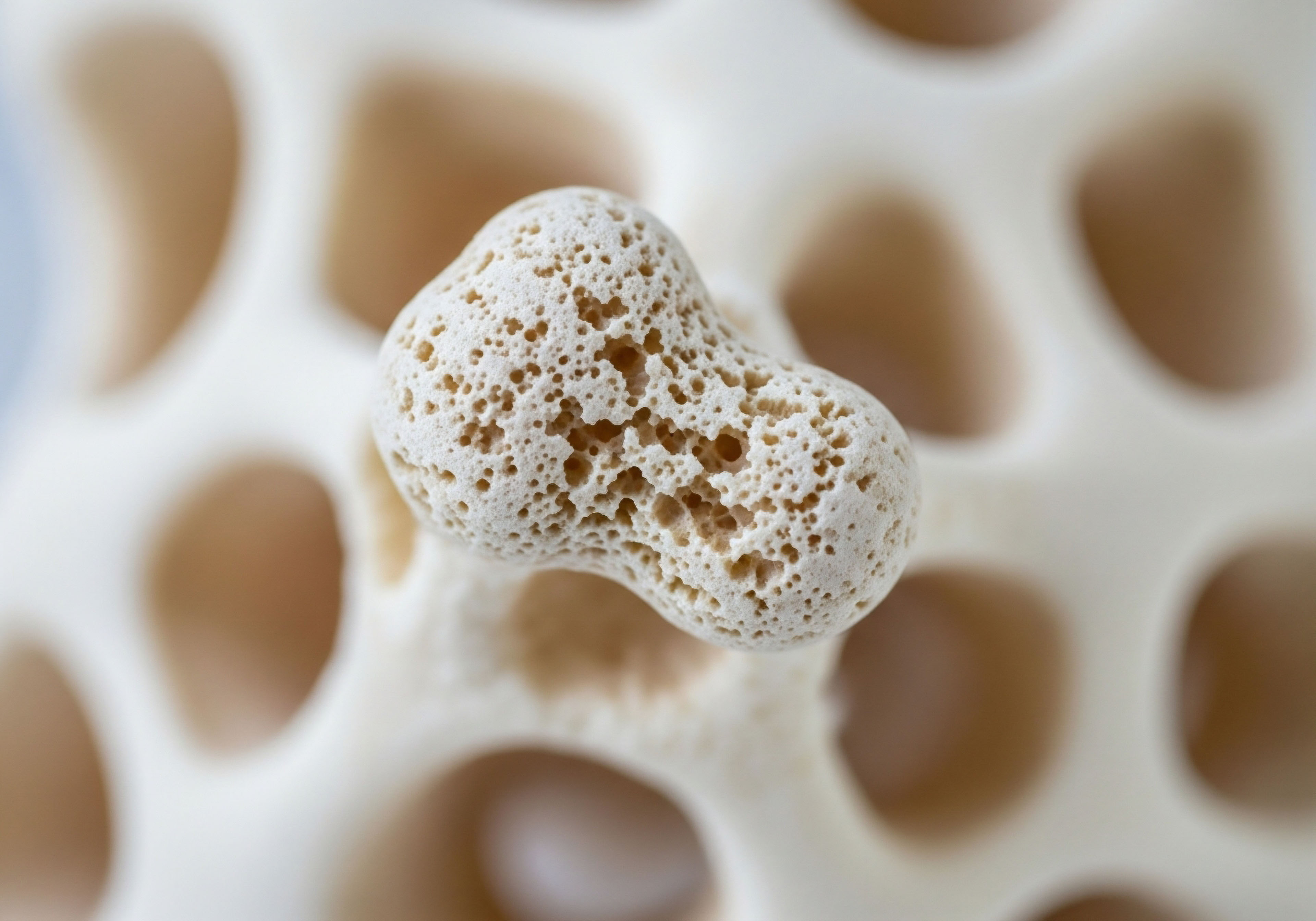

Fundamentals
You may find yourself experiencing subtle shifts ∞ a diminishing sharpness in thought, a lingering fatigue that even robust sleep cannot fully dispel, or a slight erosion of the unwavering resilience once characteristic of your professional life. These experiences, often dismissed as inevitable consequences of advancing years, frequently signal a deeper biological narrative unfolding within your body.
Optimal hormonal balance forms the bedrock of sustained mental acuity, physical stamina, and emotional equilibrium, all indispensable attributes for a thriving career over the long term.
The endocrine system, a sophisticated network of glands and the hormones they produce, acts as your body’s internal messaging service, orchestrating virtually every physiological process. Hormones function as precise biochemical messengers, influencing everything from your metabolic rate and sleep cycles to your mood and cognitive processing.
A subtle imbalance within this intricate system can manifest as a constellation of symptoms, subtly undermining your capacity for peak professional function. Understanding these underlying biological mechanisms empowers you to reclaim vitality and sustain your professional contributions without compromise.
Optimal hormonal balance underpins sustained mental clarity and professional resilience.

How Hormonal Shifts Influence Professional Output
The decline in certain hormone levels, which often commences in middle age, can directly impact various facets of career longevity. Reduced energy levels, impaired concentration, and increased susceptibility to stress are common manifestations. These physiological changes can impede complex problem-solving, diminish creative output, and reduce the capacity for sustained effort required in demanding professional environments. Recognizing these connections represents the first step toward proactive health management.
Maintaining robust cognitive function and consistent energy reserves becomes paramount for individuals seeking to extend their productive careers. Hormonal optimization protocols aim to restore physiological equilibrium, supporting the body’s innate capacity for repair, regeneration, and high-level performance. This personalized approach to wellness acknowledges your unique biological blueprint, offering a path to mitigate age-related decline and sustain your professional edge.


Intermediate
Understanding the foundational role of hormones paves the way for exploring specific clinical protocols designed to support long-term well-being and professional vitality. Hormonal optimization protocols involve precise, evidence-based interventions tailored to individual physiological needs. These strategies aim to recalibrate the endocrine system, thereby enhancing metabolic function, cognitive performance, and overall resilience, which are crucial for sustained career longevity.

Targeted Hormonal Optimization for Men
Men experiencing symptoms associated with declining testosterone levels, such as diminished energy, reduced focus, and altered mood, can find significant benefit from targeted interventions. Testosterone Replacement Therapy (TRT) protocols aim to restore testosterone to optimal physiological ranges. This often involves weekly intramuscular injections of Testosterone Cypionate, a precise method for maintaining stable hormone levels.
Adjunctive therapies frequently accompany TRT to support comprehensive endocrine health. Gonadorelin, administered via subcutaneous injections twice weekly, helps preserve natural testosterone production and fertility by stimulating the hypothalamic-pituitary-gonadal (HPG) axis. Additionally, Anastrozole, an oral tablet taken twice weekly, manages the conversion of testosterone to estrogen, preventing potential side effects associated with elevated estrogen levels. Some protocols also include Enclomiphene to further support luteinizing hormone (LH) and follicle-stimulating hormone (FSH) levels, contributing to overall endocrine harmony.
Comprehensive male hormone optimization protocols restore vitality and cognitive sharpness.

Hormonal Balance for Women through the Lifespan
Women navigating the complexities of pre-menopausal, peri-menopausal, and post-menopausal transitions often experience a spectrum of symptoms, including irregular cycles, mood fluctuations, hot flashes, and reduced libido. These changes can significantly impact professional engagement and quality of life. Tailored hormonal balance protocols address these specific needs.
One common approach involves subcutaneous injections of Testosterone Cypionate, typically administered in small, precise doses (10 ∞ 20 units weekly), to support energy, mood, and cognitive function. Progesterone is prescribed based on menopausal status, playing a crucial role in maintaining uterine health and supporting mood stability. Another option, Pellet Therapy, offers a long-acting form of testosterone delivery, with Anastrozole included when clinically appropriate to manage estrogen levels. These strategies collectively support a woman’s capacity for sustained professional performance and well-being.

Growth Hormone Peptide Therapy for Enhanced Function
For active adults and athletes seeking to optimize anti-aging processes, promote muscle gain, facilitate fat loss, and improve sleep quality, Growth Hormone Peptide Therapy presents a sophisticated option. These peptides work by stimulating the body’s natural production and release of growth hormone, rather than introducing exogenous synthetic hormones.
Key peptides in this category include Sermorelin, Ipamorelin, and CJC-1295, which act as growth hormone-releasing hormone (GHRH) analogs. They encourage the pituitary gland to secrete growth hormone in a pulsatile, physiological manner, supporting cellular repair, metabolic efficiency, and recovery.
Other peptides, such as Tesamorelin and Hexarelin, offer specific benefits related to visceral fat reduction and enhanced growth hormone secretion. MK-677, an oral secretagogue, also stimulates growth hormone release, contributing to improved body composition and sleep architecture. These interventions support the physical and mental stamina necessary for demanding professional roles.
The table below provides a concise overview of the primary goals and components of these advanced hormonal and peptide therapies.
| Therapy Type | Primary Goals | Key Components |
|---|---|---|
| Male Hormone Optimization | Restore energy, focus, mood, muscle mass; support fertility. | Testosterone Cypionate, Gonadorelin, Anastrozole, Enclomiphene. |
| Female Hormone Balance | Stabilize mood, enhance cognitive clarity, alleviate menopausal symptoms. | Testosterone Cypionate, Progesterone, Pellet Therapy, Anastrozole. |
| Growth Hormone Peptides | Improve body composition, sleep, recovery, cellular repair, cognitive health. | Sermorelin, Ipamorelin, CJC-1295, Tesamorelin, Hexarelin, MK-677. |

Other Targeted Peptides for Specific Needs
Beyond growth hormone secretagogues, other specialized peptides address distinct aspects of health that contribute to overall well-being and, by extension, career longevity. PT-141 targets sexual health, enhancing libido and function, which are important components of holistic vitality. Pentadeca Arginate (PDA), also known as BPC-157, supports tissue repair, healing, and inflammation modulation. This peptide proves valuable for individuals facing physical demands or recovery needs, helping to maintain physical integrity and prevent chronic issues that might impede professional activity.


Academic
The long-term implications of hormonal optimization for career longevity extend into the intricate molecular and systemic pathways that govern sustained cognitive function, emotional resilience, and physical endurance. A deep understanding requires exploring the interconnectedness of the neuroendocrine-metabolic axis, a complex system where hormonal signaling profoundly influences brain function and cellular energetics. This integrated perspective reveals how targeted biochemical recalibration can support an individual’s capacity for peak professional performance over decades.

Neuroendocrine Regulation of Cognitive Resilience
The Hypothalamic-Pituitary-Gonadal (HPG) axis and the Hypothalamic-Pituitary-Adrenal (HPA) axis represent central pillars of neuroendocrine regulation, directly impacting cognitive function and stress adaptation. Optimized signaling within these axes supports neurogenesis, synaptic plasticity, and neuronal network integrity, all critical for maintaining executive functions such as working memory, decision-making, and complex problem-solving. Dysregulation, often seen with age-related hormonal decline, can lead to subtle yet significant impairments in these cognitive domains, gradually eroding professional efficacy.
For instance, balanced testosterone levels in men influence spatial cognition, verbal fluency, and executive function through androgen receptors expressed throughout the brain, including the hippocampus and prefrontal cortex. Similarly, estrogen and progesterone in women play crucial roles in memory consolidation, mood regulation, and neuroprotection. The “critical window” hypothesis suggests that initiating hormone therapy in early perimenopause or postmenopause may offer more significant neuroprotective benefits, preserving cognitive function and potentially reducing the risk of neurodegenerative conditions.
Hormonal equilibrium within the neuroendocrine axes preserves vital cognitive functions.

Mitochondrial Bioenergetics and Cellular Longevity
Beyond direct neuroendocrine effects, hormonal optimization profoundly influences metabolic health at the cellular level, particularly through its impact on mitochondrial function. Mitochondria, often termed the cellular powerhouses, generate adenosine triphosphate (ATP), the primary energy currency of cells. Hormones such as growth hormone, thyroid hormones, and sex steroids regulate mitochondrial biogenesis, efficiency, and protection against oxidative stress.
Peptides like Sermorelin and Ipamorelin, by stimulating endogenous growth hormone release, indirectly support mitochondrial health and cellular repair. Higher growth hormone levels correlate with increased mitochondrial density and improved metabolic function, translating into enhanced cellular energy production and reduced cellular senescence. This cellular-level optimization directly underpins physical stamina, mental clarity, and overall physiological resilience, all essential for enduring career demands. A robust mitochondrial network provides the energetic substrate for sustained cognitive effort and rapid recovery from professional stressors.

Modulating Inflammation and Stress Response
Chronic low-grade inflammation and dysregulated stress responses pose significant threats to long-term health and career longevity. Hormonal imbalances often exacerbate these conditions. Optimal levels of hormones, including testosterone, estrogen, and cortisol (when properly regulated by the HPA axis), exert anti-inflammatory effects and help modulate the body’s response to psychological and physiological stressors.
The HPA axis, in particular, orchestrates the body’s adaptation to stress through the release of glucocorticoids like cortisol. While acute cortisol surges are adaptive, chronic elevation or dysregulation can impair hippocampal function, leading to memory deficits and increased anxiety, which directly hinder professional performance. Hormonal optimization protocols aim to restore this delicate balance, enhancing an individual’s capacity to navigate high-pressure environments with greater equanimity and sustained cognitive integrity.
The table below illustrates the intricate connection between key hormones and specific cognitive or metabolic domains, highlighting their importance for career longevity.
| Hormone/Peptide | Primary Impact Area | Relevance to Career Longevity |
|---|---|---|
| Testosterone | Cognitive function, mood, energy, muscle mass. | Sustained focus, decision-making, physical stamina, drive. |
| Estrogen/Progesterone | Memory, mood stability, neuroprotection, sleep quality. | Cognitive clarity, emotional resilience, consistent professional engagement. |
| Growth Hormone (via Peptides) | Cellular repair, metabolic efficiency, sleep architecture, body composition. | Rapid recovery, sustained energy, mental sharpness, physical health. |
| Cortisol (balanced) | Stress response, inflammatory modulation, alertness. | Adaptability under pressure, reduced burnout, mental fortitude. |
The interdisciplinary nature of these interactions underscores the necessity of a systems-biology approach to personalized wellness. Hormonal optimization, viewed through this lens, transcends mere symptom management; it represents a strategic investment in the biological infrastructure that supports an enduring and impactful professional life.

References
- Turner, D. (2020). Keys to Longevity & Aging Gracefully ∞ Hormone Optimization. David Turner MD.
- Philosophy MD. (n.d.). Hormone Optimization for Longevity. Philosophy MD.
- Charoenpao, R. (2023). Unraveling the Impact of Hormones on Longevity. VitalLife Scientific Wellness Center.
- Maki, P. M. & Henderson, V. W. (2012). Hormone therapy, dementia and cognition ∞ The Women’s Health Initiative Study 10 years on. Climacteric, 15(3), 256-262.
- Ghazal, A. S. & Hamed, A. (2024). Neuroendocrine and cellular mechanisms in stress resilience ∞ From hormonal influence in the CNS to mitochondrial dysfunction and oxidative stress. Frontiers in Endocrinology.

Reflection
The exploration of hormonal optimization and its profound connection to career longevity invites a moment of personal introspection. This knowledge serves as a compass, guiding you toward a deeper understanding of your own biological systems. Your health journey is uniquely yours, and the insights gained here mark a significant step.
Consider how these principles resonate with your current experiences and aspirations. True vitality and sustained professional contribution emerge from a conscious, informed engagement with your body’s innate intelligence. Your personalized path toward enduring wellness and peak function awaits your deliberate engagement.



